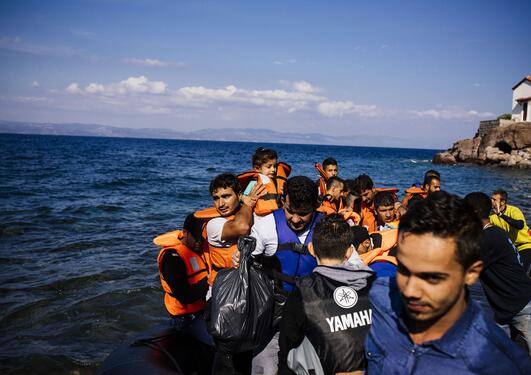New focus area successfully launched
The Faculty of Social Sciences contributes strongly within all three pillars of the focus area Global Challenges: global health, inequality and migration.

Hovedinnhold
“Global challenges are political challenges," said Professor Siri Gloppen of the Department of Comparative Politics at the University of Bergen (UiB), when she spoke in the University Aula on Monday, May 15, at the official launch of Global Challenges, one of the three priority areas in UiB's strategy 2016-22 – Ocean, Life, Society.
Governance is key
She was one of several social scientists participating in the event. In her speech, Gloppen pointed out how important governance is for creating global solutions.
“We need good governance to create solutions. We must establish a link between research and politics to solve the climate issue, issues of inequality and to improve public health,” said Gloppen.
“Government bodies are essential to make this happen. There must be a legal framework to enable governance and implementation of law, and we must have institutions with authority and legitimacy. The decisions we make must be understood as part of this framework, and must be seen in relation to knowledge and research.”
The crucial role of research
Researchers have a crucial role to play in the shaping of good governance.
“We can influence political decision-making. To achieve this we must use appropriate tools. We need to understand why we often see political failures in the climate debate and other global issues,” said Gloppen.
The UiB researcher emphasized the work at the Centre on Law and Social Transformation, which she leads and which is a collaboration between UiB and the Chr. Michelsen Institute (CMI). The centre consists of researchers and partners from all over the world.
“Research is essential to strengthen political decision-making. At the centre there are researchers from five faculties at UiB and a number of other institutions in research and higher education,” Gloppen said.
Professor Hakan G. Sicakkan, also from the Department of Comparative Politics, also attended the launch. He is currently working on a major research project on migration.
Global focus important for faculty
Professor Ståle Knudsen is head of UiB's Department of Social Anthropology and the Faculty of Social Sciences' representative in the advisory board for the Global Challenges focus area.
“This is a significant commitment for UiB and the faculty. As the faculty's representative, I am concerned with the significant role the social sciences have in global research and global studies at UiB. As a faculty, we have always had a lot of contact with research environments internationally and we also have a lot of student exchange, both in Europe and in the rest of the world,” Knudsen said.
Within the focus area of Global Challenges, three areas in particular have been highlighted as part of the UiB strategy: global health, inequality, and migration. All of which have long traditions at the Faculty of Social Sciences, both in research and education.
Establishing interdisciplinary education
At the launch, Knudsen also talked about the importance of interdisciplinary education as part of the Global Challenges.
“It's important that we share this concept, which will be time-consuming and involve plenty of compromises along the way. This is why we need the right combination of people to work together on this. However, we also need support from the university leadership and will need extra resources to truly achieve interdisciplinary study programmes,” Knudsen said at the official launch of the Global Challenges.
